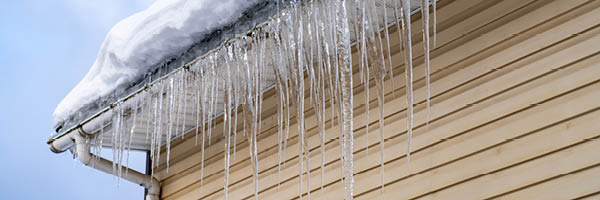Tips to winterize your home
Posted in Home

While your homeowners insurance policy likely covers your home from all direct physical loss (unless included within the exclusions section of your policy), your personal property is generally only protected from specific perils listed in your policy. With winter comes the added risk of weather-related damage and losses — many of which are avoidable when you take the precautions listed below:
Ice dams
Ice dams can form at the edge of your roof and prevent water and ice from draining properly from your roof. This water can be forced back up through your shingles and cause damage to the wood decking of your roof; it can even enter your home and cause damage to your ceiling, walls and furnishings.
- Common causes of ice dams:
- Heat escaping from the attic and allowing snow or ice to melt and run down to the cooler roof space at the eaves where this water may re-freeze and form a dam at the edge of the roof
- Gutters clogged with leaves and other debris can also contribute to ice dam build ups
- Eliminating the problem:
- Make sure there are no spots where air is leaking into your attic, warming the roof and causing snow and ice to melt
- Check your attic insulation to make sure it’s the appropriate thickness to help avoid roof melt
- After the leaves have all fallen, clean out the gutters to make sure they’re free from debris that could cause clogs and buildup
Fire
Fire is one of the leading causes of damage in the winter, due to the increase in fireplace use. Many of the related causes of fire damage can be avoided with regular inspection and preventive maintenance.
- Common causes of winter fires:
- Thick, oily creosote deposits can build up over time inside wood burning chimneys and catch fire. Chimney fires aren’t always immediately detected, giving the fire a chance to spread to other areas of the home
- Inappropriate use of space heaters may lead to fire if cords are worn or the unit is placed near flammable items
- Some homeowners try to thaw frozen pipes using a torch or other open flame, leading to an unintended fire in a neighboring wall space or through the pipe conducting heat
- Operator error, mechanical failure, unmaintained furnaces, and misuse of equipment are leading causes of fires that begin in furnaces
- Eliminating risk of fire:
- Have your chimney inspected and cleaned annually. Make sure flues are working properly to prevent carbon monoxide from accumulating in the house
- Use only extension cords that have the necessary rating to carry the amp load of space heaters. Choose a cord the same size or larger than the appliance’s cord
- Be sure your smoke alarms are installed in appropriate places throughout the home and inspect their functionality every six months. Battery-operated units and hard-wired units with battery backup should have batteries replaced twice a year
- Have your ductwork inspected and cleaned annually to prevent dust or lint buildup that pose a fire risk; remove lint from your dryer duct every six months
- Remove all flammable materials from the area around your furnace
- Change your furnace filter at least once during heating season, according to the specifications of your furnace or filter type
- Have your furnace inspected annually. This will include a professional check of the filters, thermostat, electrical components, air flow, and evaluation of any cracks or possible wear and tear that may indicate repair or replacement
- Install a temperature-sensitive alarm system

Learn about our
Home Insurance
Water damage
- Common causes of water damage:
- Frozen pipes or mechanical malfunction of appliances can lead to a real disaster when the temperature drops
- Cracks or holes surrounding windows and doors allow openings for water to enter your home
- If your home or vacation property will be unoccupied for an extended period of time, hazards may exist with your water heater, exterior pipes or appliance
- Minimize risk of water damage:
- Check pipes that may be susceptible to cold air (under sinks, near exterior walls) and use appropriate wrap-on heat tape or insulation to protect them
- Check the seals around exterior windows and doors and caulk them if necessary to keep out the elements
- Do not leave hoses attached to exterior faucets, as this can allow for water inside the faucet to freeze and cause the pipe to burst
- Have your hot water heater inspected regularly — the average life expectancy of a hot water heater is 10 to12 years — to make sure it’s in good working order
While the most common areas of winter loss prevention relate to your home itself, protecting visitors can be equally important. Make sure to keep your driveway and sidewalks completely free of ice and snow (keep a bucket of salt on-hand to help eliminate icy spots) and remove overhead icicles that could cause injury to those walking beneath them. If you can’t reach the icicles, put barriers directly underneath so people avoid the area.
This article is for informational and suggestion purposes only. Implementing one or more of these suggestions does not guarantee coverage. If any policy coverage descriptions in this article conflict with the language in the policy, the language in the policy applies. For full details on Integrity’s home insurance coverages and discounts, contact your local, independent Integrity insurance agent.
Share via:
Facebook
LinkedIn
Email
Related resources